|
|
|
Sort Order |
|
|
|
Items / Page
|
|
|
|
|
|
|
| Srl | Item |
| 1 |
ID:
147232
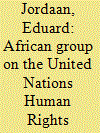

|
|
|
|
|
| Summary/Abstract |
During the early years of the United Nations Human Rights Council, formed in 2006, the African Group obstructed efforts to scrutinize and improve human rights in specific countries, notably in the cases of Darfur and the Democratic Republic of the Congo. However, in recent years the African Group has become willing to address country-specific human rights violations, particularly in Côte d'Ivoire, Libya, and Eritrea. This article documents the African Group's shift and asks why it occurred. Against the backdrop of debates about whether the liberal international order can survive a decline in American dominance, the study of the African Group's shift grants us insight into the elements that underpin liberal internationalism. Three explanations for the African Group's shift are considered: an improvement in the domestic human rights profile of African Group members, changes to the internal dynamics of the African Group, and the influence of the United States. The article concludes that American power was decisive, a finding that raises doubt about whether the liberal international order will survive a decline in American power.
|
|
|
|
|
|
|
|
|
|
|
|
|
|
|
|
| 2 |
ID:
170417
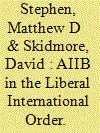

|
|
|
|
|
| Summary/Abstract |
The rise of China raises fundamental questions about the future of the liberal international order (LIO) at a time when it is under ever more strain. Although China’s focus for some years was on joining and participating in existing multilateral institutions, today China is increasingly building its own. Prominent among them is the Asian Infrastructure Investment Bank (AIIB), launched in late 2014. Against the background of contending theoretical expectations, this article examines the extent to which the AIIB either reinforces or challenges the LIO and highlights what this tells us about China’s broader relationship with the LIO. We provide a definition of the LIO that is based on its social purpose rather than on its formal characteristics. State-centric approaches offer insights into China’s decision to engage in new institution building via the AIIB, but we argue that a focus on social purpose is necessary to assess the AIIB’s broader implications for the LIO. We find that, while conforming in large measure to existing institutional models, the AIIB promotes China’s integration into global social networks, strengthens state-led development pathways, and is associated with the Chinese norm of non-interference. The AIIB, thus, foreshadows the possibility of an institutionalised international order indifferent to liberalism. In sum, the AIIB reflects the tensions between the socialising effects of the LIO and China’s growing externalisation of its own non-liberal, state-led model of political economy.
|
|
|
|
|
|
|
|
|
|
|
|
|
|
|
|
| 3 |
ID:
191734
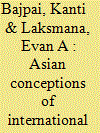

|
|
|
|
|
| Summary/Abstract |
How do major Asian states regard the current international security order? Do they agree or disagree among themselves? This is an introduction to a special section on ‘Asian conceptions of international order: what Asia wants’. It draws on articles analysing the stances of China, India, Japan, South Korea, Indonesia, Malaysia, Singapore, Thailand, Philippines and Vietnam towards the existing international security order usually described as a liberal international order (LIO). It argues that Asian states substantially support the main constitutive and regulatory norms and institutions of the LIO, but they worry that the LIO does not consistently honour these norms. Asians disagree on the centrality of political liberalism, but even Japan and South Korea, the most liberal states, are uncomfortable with strident criticism, punishment and the exclusion of less liberal states. Asians also disagree on the role of US alliances: some are strongly supportive, some are ambivalent and some are negative. Finally, Asians disagree on how they voice dissatisfaction. Japan and South Korea supplement existing norms and institutions as a way of transcending the limitations of the LIO; south-east Asian states promote ASEAN's mediatory role for peace and security above and beyond existing global arrangements; and Indonesia, India and China want to move from being norm takers to becoming norm shapers. The introduction ends with six policy implications.
|
|
|
|
|
|
|
|
|
|
|
|
|
|
|
|
| 4 |
ID:
165745
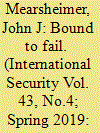

|
|
|
|
|
| Summary/Abstract |
The liberal international order, erected after the Cold War, was crumbling by 2019. It was flawed from the start and thus destined to fail. The spread of liberal democracy around the globe—essential for building that order—faced strong resistance because of nationalism, which emphasizes self-determination. Some targeted states also resisted U.S. efforts to promote liberal democracy for security-related reasons. Additionally, problems arose because a liberal order calls for states to delegate substantial decisionmaking authority to international institutions and to allow refugees and immigrants to move easily across borders. Modern nation-states privilege sovereignty and national identity, however, which guarantees trouble when institutions become powerful and borders porous. Furthermore, the hyperglobalization that is integral to the liberal order creates economic problems among the lower and middle classes within the liberal democracies, fueling a backlash against that order. Finally, the liberal order accelerated China's rise, which helped transform the system from unipolar to multipolar. A liberal international order is possible only in unipolarity. The new multipolar world will feature three realist orders: a thin international order that facilitates cooperation, and two bounded orders—one dominated by China, the other by the United States—poised for waging security competition between them.
|
|
|
|
|
|
|
|
|
|
|
|
|
|
|
|
| 5 |
ID:
188676
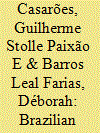

|
|
|
|
|
| Summary/Abstract |
This paper engages with debates over the Liberal International Order (LIO) and Latin America by focusing on Brazil. More specifically, it addresses President Jair Bolsonaro’s foreign policy. His radical-right populist and religious-infused approach has been characterised by an explicit rejection of practically all elements of the LIO, including multilateralism, multiculturism, and regionalism—historically core features of Brazilian foreign policy. We seek to answer two interrelated questions: (1) what were the political conditions—domestic and international—that allowed for such dramatic foreign policy change? (2) what impact is Brazil’s new foreign policy orientation having on the LIO? To address them, we resort to the aspirational constructivist theory, which has allowed us to theorise Brazil’s new identity formation. We argue that Bolsonaro has reshaped Brazil’s foreign policy as part of his endeavour to create a national self-image based on three pillars: anti-globalism, anti-Communism, and religious nationalism. By doing so, the Bolsonaro administration has transformed Brazil, otherwise an avid supporter of the LIO, into one of the order’s most vocal critics. While anti-globalism (and, subsidiarily, anti-Communism) undermines the normative and institutional foundations of the LIO, religious nationalism offers a replacement to the order, based on independent ethno-nationalist communities. If Brazil’s radical right populist model spreads across Latin America, it has the potential to hollow out the region’s support to the LIO.
|
|
|
|
|
|
|
|
|
|
|
|
|
|
|
|
| 6 |
ID:
178565
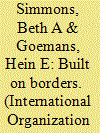

|
|
|
|
|
| Summary/Abstract |
The Liberal International Order is in crisis. While the symptoms are clear to many, the deep roots of this crisis remain obscured. We propose that the Liberal International Order is in tension with the older Sovereign Territorial Order, which is founded on territoriality and borders to create group identities, the territorial state, and the modern international system. The Liberal International Order, in contrast, privileges universality at the expense of groups and group rights. A recognition of this fundamental tension makes it possible to see that some crises that were thought to be unconnected have a common cause: the neglect of the coordinating power of borders. We sketch out new research agendas to show how this tension manifests itself in a broad range of phenomena of interest.
|
|
|
|
|
|
|
|
|
|
|
|
|
|
|
|
| 7 |
ID:
154643
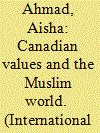

|
|
|
|
|
| Summary/Abstract |
The Canadian Charter of Rights and Freedoms constitutes the fundamental value system of our nation. The rise of anti-Muslim extremism thus presents a direct challenge to the core principles that define our liberal democracy. As our international order transforms, power polarities shift, and illiberal ideas spread across North America and Western Europe, maintaining commitment to these core Canadian values will become increasingly difficult. If our chief allies enact policies against their minority Muslim populations in the name of security, Canada will be put under pressure to do the same here at home, with devastating consequences for our democracy. Moreover, how Canada responds to the complex and multilayered crises that have gripped many parts of the modern Muslim world will have grave implications for both domestic and international security. Ideologically-motivated slogans do nothing to keep Canadians safe. It is therefore crucial that Canada continues to reject illiberal extremism and champions evidence-based international security policies, with a heavy investment in detailed ground-level analysis of these complex conflict theatres.
|
|
|
|
|
|
|
|
|
|
|
|
|
|
|
|
| 8 |
ID:
174072
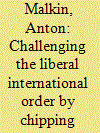

|
|
|
|
|
| Summary/Abstract |
This paper examines China’s investments in Russia as a case study of China’s challenge to the liberal order. It surveys the political economy of China’s state-owned enterprises—the primary vehicles for China’s investments in Russia—in a global context. It argues that China’s investments in Russia constitute an emerging structural economic challenge to the liberal international order. The trend of China’s investments in Russia illustrates Beijing’s strategy of fostering global economic integration that ultimately may not conform to the geopolitical underpinnings of a liberal international order. It looks at two cases of China’s investments in Russia: the technology sector and the financial sector. It shows that the liberal order’s tension with China’s strategy vis-à-vis globalization is rooted in its impact on US structural power and suggests that the active presence of Chinese state-guided capital in Russia’s high-tech development and its financial system illustrate the nature of this challenge.
|
|
|
|
|
|
|
|
|
|
|
|
|
|
|
|
| 9 |
ID:
191735
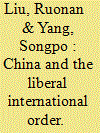

|
|
|
|
|
| Summary/Abstract |
How can we make sense of China's perceptions of and relationship with the liberal international order (LIO)? The majority of notable works on this topic have been written by foreign scholars who emphasize China's discontent with, or challenges it poses to, the LIO, while Chinese scholars have either focused solely on academic debates or attempted to interpret official foreign policies. This article aims to provide a balanced analysis of China's view of order by examining theoretical thought and policy practices from a Chinese perspective, drawing insights from both Chinese academic writings and government statements. We argue that there exists a perceptual difference between China and the West in understanding the postwar international order, with China emphasizing the functional part of the order and the West regarding it as based on its preferred ideological values. This perceptual difference has caused international suspicion about China's potential intentions to overthrow the LIO. In practice, China's approach has remained pragmatic, interacting dynamically with different subcomponents of the LIO. Although China's recent interactions with the LIO appear more ambitious, internal and external constraints, insufficient capacity, and lack of universally appealing values are preventing the birth of a Chinese version of international order.
|
|
|
|
|
|
|
|
|
|
|
|
|
|
|
|
| 10 |
ID:
144641
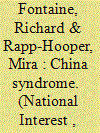

|
|
|
|
|
| Summary/Abstract |
CHINA’S RAPID ascent to great-power status has, more than any other international development, raised concerns about the future of the liberal international order. Forged in the ashes of the Second World War, that order has enabled a seven-decade period of great-power peace, the expansion of democratic rule and a massive increase in global prosperity. Now, it seems, world order is under threat—not least from China’s rising power. While Beijing has thus far avoided active military aggression and refrained from exclusionary economic arrangements, American policymakers worry quite openly about China’s challenge to the underlying rules of the road. They hope that Beijing will embrace the existing pillars of global order and even work to support them; they fear that China will prove revisionist, seeking to undermine the rules-based order and fashion an illiberal alternative that excludes the United States.
|
|
|
|
|
|
|
|
|
|
|
|
|
|
|
|
| 11 |
ID:
192167
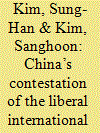

|
|
|
|
|
| Summary/Abstract |
The concept of ‘revisionism’ has caught the attention of international relations scholars amid intensifying rivalry between the United States and China. It is a trademark of rising powers, and China was likewise expected to become a revisionist power, intent on changing the status quo. However, history tells us that not all rising powers necessarily become revolutionary states, seeking to overturn the prevailing order and replace it with another through hegemonic wars. This paper presents a novel understanding of revisionism by distinguishing between strategic ‘contestation’ and ‘challenge’. In the context of declining unipolarity, a dissatisfied rising power will contest the rules and principles of issue-specific regimes and demand legitimate adjustments that better reflect the new distribution of power. A challenge emerges when demands are rejected, and a contestation leads to ‘deconcentration’ and ‘delegitimation’ of the established order. The establishment of the AIIB can be examined as an example of contested multilateralism that falls short of a challenge. This paper concludes that China is ‘contesting’, not ‘challenging’ the liberal international order and suggests a set of countermeasures that the U.S. can think of: selective accommodation, reinforcement of alliances and partnerships, and overcoming domestic challenges such as populism that undermine the liberal values, constitutive of the liberal international order.
|
|
|
|
|
|
|
|
|
|
|
|
|
|
|
|
| 12 |
ID:
196746


|
|
|
|
|
| Summary/Abstract |
China is seen as undemocratic, illiberal, and autocratic by many who live outside it, and the terms “democracy” and “China” are often difficult to reconcile. Nonetheless, Beijing has been actively employing the concept of democracy both domestically and on the international stage in recent years. This paper aims to critically examine how Beijing conceptualizes and advocates for democracy at home and abroad. It also endeavors to explore the implications for the country’s domestic and global governance, particularly in relation to the US-centered liberal international order in the context of critical international relations studies. In so doing, this paper will focus methodologically on Beijing’s official documents and state media outlets, presenting an argument that is twofold. First, by promoting its unique form of democracy known as “whole-process people’s democracy,” Beijing domestically intertwines democracy with authoritarianism, hierarchy, and dictatorship. This whole-process people’s democracy appears to function at home as a tool of regime security that is characterized by a rule that is of and for the people but not by the people. Second, China on the international stage has adopted Western-style liberal values to advocate for enhanced democracy in international relations. Through its strategic adoption of these liberal values, Beijing accuses the United States of a hegemonic liberal hypocrisy in international relations while appearing to aspire to a world that is fragmented into essentially different entities.
|
|
|
|
|
|
|
|
|
|
|
|
|
|
|
|
| 13 |
ID:
178552
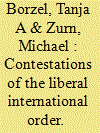

|
|
|
|
|
| Summary/Abstract |
The 1990s saw a systemic shift from the liberal post–World War II international order of liberal multilateralism (LIO I) to a post–Cold War international order of postnational liberalism (LIO II). LIO II has not been only rule-based but has openly pursued a liberal social purpose with a significant amount of authority beyond the nation-state. While postnational liberal institutions helped increase overall well-being globally, they were criticized for using double standards and institutionalizing state inequality. We argue that these institutional features of the postnational LIO II led to legitimation problems, which explain both the current wave of contestations and the strategies chosen by different contestants. We develop our argument first by mapping the growing liberal intrusiveness of international institutions. Second, we demonstrate the increased level and variety of contestations in international security and international refugee law. We show that increased liberal intrusiveness has led to a variety of contestation strategies, the choice of which is affected by the preference of a contestant regarding postnational liberalism and its power within the contested institution.
|
|
|
|
|
|
|
|
|
|
|
|
|
|
|
|
| 14 |
ID:
181686
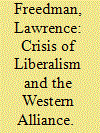

|
|
|
|
|
| Summary/Abstract |
Liberalism as the ideology of the Western alliance is in crisis. Having seen off Nazism and communism, it gained influence after the end of the Cold War, which produced optimism about security, human rights and global prosperity. Now liberalism, shaken by the financial crisis and the wars in Afghanistan and Iraq, is in retreat. Illiberal states, notably China and Russia, are reshaping the international system. Liberalism may not be able to continue to bind allies together, or enable them to cooperate effectively in a severe crisis. There are three counters to a gloomy prognosis, however. Firstly, heightened great-power competition has reinforced rather than undermined the alliance. Secondly, Russia and China have no substantial alliances, and are showing that authoritarian governments face serious problems of their own, including entrenched leaderships. Thirdly, liberalism remains better equipped to adapt to new circumstances.
|
|
|
|
|
|
|
|
|
|
|
|
|
|
|
|
| 15 |
ID:
178580
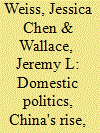

|
|
|
|
|
| Summary/Abstract |
With the future of liberal internationalism in question, how will China's growing power and influence reshape world politics? We argue that views of the Liberal International Order (LIO) as integrative and resilient have been too optimistic for two reasons. First, China's ability to profit from within the system has shaken the domestic consensus in the United States on preserving the existing LIO. Second, features of Chinese Communist Party rule chafe against many of the fundamental principles of the LIO, but could coexist with a return to Westphalian principles and markets that are embedded in domestic systems of control. How, then, do authoritarian states like China pick and choose how to engage with key institutions and norms within the LIO? We propose a framework that highlights two domestic variables—centrality and heterogeneity—and their implications for China's international behavior. We illustrate the framework with examples from China's approach to climate change, trade and exchange rates, Internet governance, territorial sovereignty, arms control, and humanitarian intervention. Finally, we conclude by considering what alternative versions of international order might emerge as China's influence grows.
|
|
|
|
|
|
|
|
|
|
|
|
|
|
|
|
| 16 |
ID:
151588
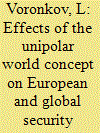

|
|
|
|
|
| Summary/Abstract |
BEHIND THE POLICY of Western countries and their allies toward Russia in the Ukrainian crisis is a long-term strategy adopted by key Western powers, and the Ukrainian conflict is just one manifestation of this strategy. Claims by the United States that it is the world leader, far from raising any objections from its allies, are supported by them in every way.
|
|
|
|
|
|
|
|
|
|
|
|
|
|
|
|
| 17 |
ID:
180367
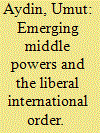

|
|
|
|
|
| Summary/Abstract |
In the post-Cold War era, a number of middle powers rose to prominence thanks to domestic reforms and a favourable international environment of economic and political globalization. These countries began to pursue middle power foreign policies, working actively in international organizations, engaging in areas such as conflict mediation, humanitarian assistance and the promotion of human rights, and helping to diffuse democracy and market reforms in their neighbourhoods. In this way, they contributed to the stability and expansion of the liberal international order in the post-Cold War period. Nonetheless, recent democratic and economic backsliding in these middle powers raises concerns. Focusing on the cases of Turkey and Mexico, this article explores how reversals in democratic and market reforms, exacerbated by recent trends towards deglobalization, influence emerging middle powers' foreign policies and their potential contributions to the liberal international order. I argue that whereas their rise had helped reinforce and expand the liberal international order, emerging middle powers' illiberal turn may have a destabilizing effect on this order.
|
|
|
|
|
|
|
|
|
|
|
|
|
|
|
|
| 18 |
ID:
187417
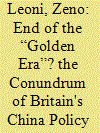

|
|
|
|
|
| Summary/Abstract |
This analysis contributes to a fast-growing body of literature on Sino-Western relations and the tension between economic and security interests. It takes Britain's China policy as a case study considering the Integrated Review 2021. It argues that London's stance towards Beijing has shifted – officially – from the so-called “golden era” to a complex phase of diplomatic–military tensions and scrutinised economic relations, principally because of US pressure. However, this shift de facto has not had a structural impact on the economic side of the relationship between London and Beijing. The article reaches this conclusion by framing its narrative through the lens of the economy-security conundrum at the heart of the Liberal International Order and through the lens of the New Cold War between the US and China. These two factors are crucial for understanding the change between Britain's China policy pre- and post-2016.
|
|
|
|
|
|
|
|
|
|
|
|
|
|
|
|
| 19 |
ID:
193404
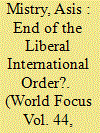

|
|
|
| 20 |
ID:
178562
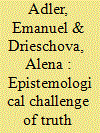

|
|
|
|
|
| Summary/Abstract |
Truth-subversion practices, which populist leaders utilize for political domination, are a significant source of current pressure on the Liberal International Order (LIO). Truth-subversion practices include false speak (flagrant lying to subvert the concept of facts), double speak (intentional internal contradictions in speech to erode reason), and flooding (the emission of many messages into the public domain to create confusion). Aiming to destroy liberal truth ideals and practices, truth subversion weakens epistemological security; that is, the experience of orderliness and safety that results from people's and institutions’ shared understandings of their common-sense reality. It privileges baseless claims over fact-based opinions, thus creating communities of the like-minded between which communication becomes impossible. Truth subversion challenges the LIO's three key institutions: democracy, markets, and multilateralism. If truth-subversion practices prevail, societal polarization, inaccurate information, and emotional inflaming strain democracy and human rights protections. Markets that depend for their functioning on accurate information can falter, and multilateralism that relies on communication and reasoned consensus can decay. International relations (IR) scholarship has recognized knowledge production practices as a key feature underlying the LIO, but has not yet identified challenges to those practices as a threat for the LIO. We discuss what the discipline can do to alleviate its blind spots.
|
|
|
|
|
|
|
|
|
|
|
|
|
|
|
|
|
|
|
|
|